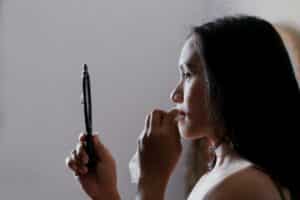PCOS, or polycystic ovary syndrome, is a condition in women that is commonly associated with hair loss. In this blog post, we will discuss what PCOS is, how it affects hair growth, and how to treat hair loss due to PCOS.

What is PCOS?
PCOS is a hormonal disorder that affects women of reproductive age. It is caused by an imbalance of hormones, including testosterone and insulin. Women with PCOS may experience a variety of symptoms, including irregular periods, acne, hirsutism, weight gain, and hair loss. People with PCOS are at increased risk of metabolic syndrome which is associated with visceral obesity, insulin resistance and risk of cardiovascular disease.
How does PCOS affect hair growth?
PCOS can cause hair loss in several ways. First, the high levels of testosterone in women with PCOS can lead to hair thinning and balding. Testosterone is a male hormone that is present in both men and women, but women with PCOS have higher levels of it than normal.
Second, insulin resistance, which is common in women with PCOS, can also lead to hair loss. Insulin is a hormone that regulates blood sugar levels in the body. When the body becomes resistant to insulin, it can lead to high blood sugar levels and other health problems, including hair loss.
Third, inflammation may also play a role in hair loss in women with PCOS. Inflammation is the body’s response to injury or infection. When the body is inflamed, it can affect hair growth and lead to hair loss.
How to treat alopecia due to PCOS
Fortunately, there are several ways to treat hair loss due to PCOS. Many are the same used to treat androgenetic alopecia. Here are some options to consider:
- Minoxidil: This medication is applied to the scalp to promote hair growth.
- Spironolactone: This medication blocks the effects of testosterone in the body, which can help reduce hair and treat many of the other symptoms of PCOS
- low level light therapy
- Alma TED hair restoration
- Eating a healthy diet: Eating a balanced diet that is rich in vitamins and minerals can help promote hair growth.
- Exercising regularly: Exercise can help reduce insulin resistance, which can lead to hair loss.
- Managing stress: Stress can affect hormone levels in the body, which can lead to hair loss. Managing stress through activities like yoga, meditation, or deep breathing can help reduce hair loss.
- Hair transplant surgery
Conclusion
Alopecia can be a distressing symptom of PCOS, but it is treatable. If you are experiencing hair loss due to PCOS, talk to our board-certified dermatologist and hair loss expert. With the right treatment plan, you can promote hair growth and restore your confidence. Schedule a consultation here.
Watch: Why it’s important to get a diagnosis for your hair loss


